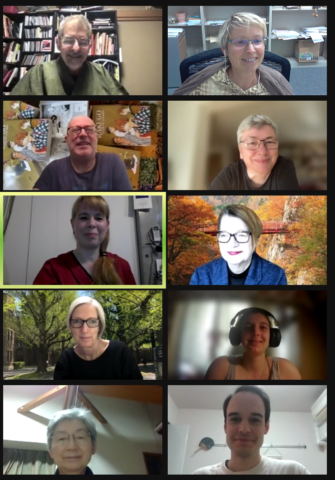さんのプロフィールページ-480x274.png)
Download
Anmeldung
This is a past event. Registration is no longer possible.
Please subscribe to our DIJ Newsletter to stay informed about our research activities, events, and publications:
From learning good manners to training one’s own apprentices: Female rakugo performers on Tokyo’s stages
20. Oktober 2021
Sarah Stark, University of Ghent

When talking about traditional Japanese stage-arts, what comes to mind is men in kimono. In most stage arts, to this day, female performers are either not trained at all or trained but not accepted to perform in their respective schools’ main stages. Until recently, this was also true for Tokyo’s rakugo world. While records of female performers on Tokyo’s rakugo stages exist as early as the late Edo period, there has been a long-lasting opposition to allowing female performers to train and perform. The first two female performers were promoted to shin’uchi (master/headliner) in 1993. In March 2021, Benzaitei Izumi was promoted to shin’uchi as the first female disciple of a female performer.
Today, about 5% of Tokyo’s rakugo performers are female and most enjoy a big fan following. However, the portfolio of rakugo stories has been created by men for (mostly) male audiences. This presentation gave an historic overview of the development of the involvement of female performers on Tokyo’s yose stages and discussed the different approaches that female performers take on-stage, in green rooms and with audiences, particularly looking into issues such as modification of stories, voice, tone, appearance and stage persona as well as the earliest training stage of zenza, which all performers in Tokyo must go through.
More than 20 participants from Europe and Japan joined the lively discussion that followed the presentation. It also provided detailed insights into similarities and differences compared to the situation of women in other traditional performing arts such as noh; during the discussion it became clear that it is important to think of the performer-audience relation as extending beyond the stage.
Sarah Stark is a Ph.D. candidate at the Faculteit Letteren en Wijsbegeerte at the University of Ghent (Belgium). She studied at the University of Trier, the Tokyo Gakugei Daigaku as well as the University of Edinburgh. She is writing her dissertation on the training of rakugo performers in Tokyo.